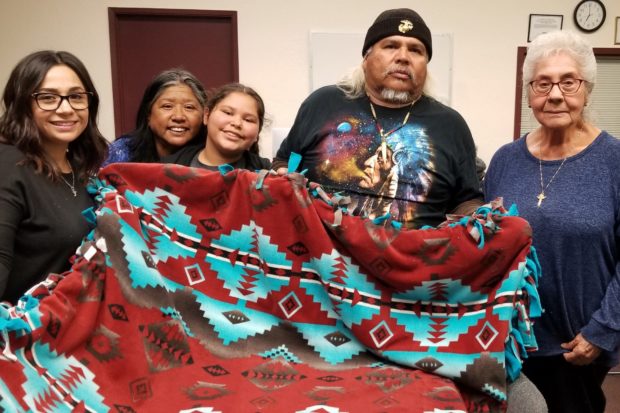
By Serena Cuevas
The Fresno American Indian Health Project (FAIHP), a nonprofit agency, is a culturally sensitive health access and advocacy program for American Indians and Alaska Natives. The FAIHP has been serving the Native community of Fresno since 2007. The agency now offers a variety of services including health screenings and referrals, mental health services, case management, transportation, nutrition education, a community garden, prevention and intervention programs, and a youth after-school program.
Earlier this year, the FAIHP was awarded a Kaiser Permanente grant, which will allow funding for agency expansion, both in size and in services, as it breaks ground on a new fully equipped medical clinic. With the expansion of the facility, the agency intends to raise community awareness about what it does and how to pass on the traditions of ancestors in Fresno.
American Indian/Alaska Natives make up one of the smallest ethnic populations in Fresno County. Of the few remaining rancherias in the area, the Cold Springs Rancheria, the Big Sandy Rancheria and the Table Mountain Rancheria are in Fresno County, whereas the North Fork Rancheria and the Picayune Rancheria are in Madera County.
Though Native Americans are largely underrepresented in society today, there are a number of structures that exist to remind Fresno County inhabitants of their history. One such structure is the Henry Madden Library at Fresno State.
With a generous donation from the Picayune Rancheria of Chukchansi Indians, the Henry Madden Library was rebuilt in 2004, with the inclusion of the Table Mountain Rancheria Tower. The five-floor structure was built in the shape of an elliptical with steel, glass and slanted wood to resemble a weaved Native American basket. The tower also features the Table Mountain Rancheria Reading Room where historical images and plaques about the history of Natives in Fresno County are often displayed.
Another notable structure in Fresno County is the Table Mountain Casino. Located on the Table Mountain Rancheria, the Table Mountain Casino is one of the most successful casinos in Fresno County. Located in Friant, the casino is known for its slot machines, card tables, restaurants, golf course and entertainment venue.
The Chukchansi tribe also has contributed to the local Grizzlies baseball team as its leading sponsor. Located in downtown Fresno, the stadium was renamed to honor the Chukchansi tribe in 2006.
The urban Indian population of Fresno County has a dynamic array of additional assets to offer to the community. One of the most valuable assets being the wisdom and knowledge passed on, often by elders. As is the case with most communities, elders are considered to have the most knowledge and wisdom, and many are keen to share their stories.
The FAIHP hosts intergenerational activities where Native youth and elders work on cultural crafts and other various activities. Elders are also supported in several wellness and support groups offered at the FAIHP, including the WISE Elders group, Beading for Stress Management and the Diabetes groups.
The primary goal of the FAIHP is to meet the needs of the local Native American community. Through community needs assessments, surveys and the Community Advisory Board, the FAIHP learns what the community wants from the agency. The primary demand is to see aspects of the traditional cultures of the Native peoples in the agency’s services. That being said, the FAIHP emphasizes the value of passing down traditions and keeping Native American culture alive in its programming.
The FAIHP regularly hosts culture-driven activities. In November 2018, it hosted the Native Days Car Show. The Two-Spirit group is a safe space for Native LGBTQ+ to meet and engage in cultural crafts. The Wellbriety group is a sobriety support group that implements methods of healing and engages dialogue about what addiction looks like in Native culture. The community garden is a place where agency activities are held, culture is practiced and hands-on gardening is implemented.
The FAIHP also hosts events and engages in local community outreach to make itself more visible to the public, not just about the services offered but also as a reminder that the Native community in Fresno is very much present.
One of the most pressing challenges that the community continues to face is generational oppression. Native Americans of Fresno County know that some of their family members were victims of colonization and mass persecution.
May elders have stories about the tragedies that their ancestors faced at the hands of colonizers. Many remember when the Indian Civil Rights Act passed in 1968. With cases of generational oppression often come feelings of insecurity and inferiority. Depression, anxiety, trauma, and other mental illnesses are highly stigmatized in Native culture, so higher rates of suicide are often seen in this population.
The FAIHP is working to bring Native Americans of all tribal backgrounds together to discuss and be provided with education and healing. The agency touches on such controversial issues as domestic and intimate partner violence, mental illness, and suicide awareness and prevention.
In the past year, the FAIHP has taken strides to open conversations with the community by hosting events such as a Domestic Violence Awareness and Self-Defense Workshop, Mental Health First Aid Training for community members, a Suicide Awareness Vigil and social media campaigns that focus on reducing mental health stigma.
The FAIHP’s Community Advisory Board meets the third Monday of every month to collaborate on ideas and engage with community members and FAIHP employees on how to better serve the American Indian/Alaska Native population of Fresno. For more information, call 559-320-0490 or like the FAIHP on Facebook to keep up with current events.
*****
Serena Cuevas is a student intern with the Fresno American Indian Health Project. She is currently pursuing a social work degree at Fresno State.
